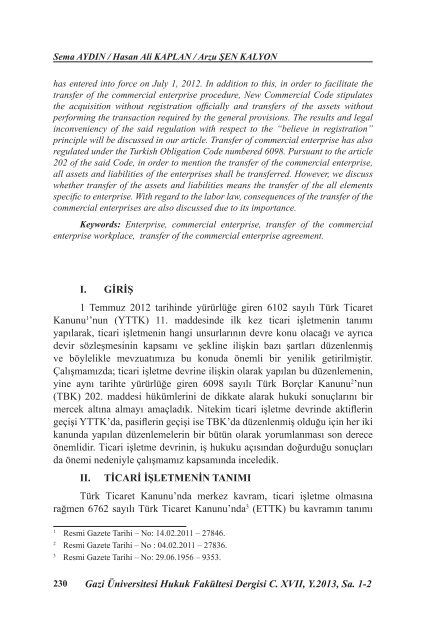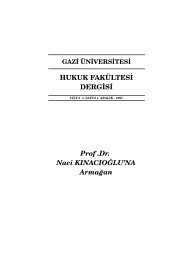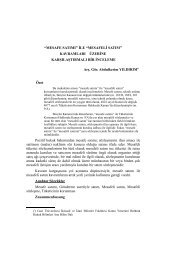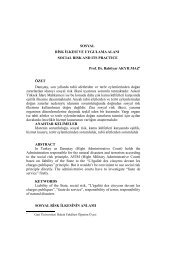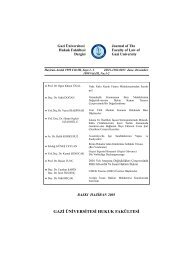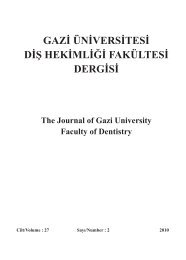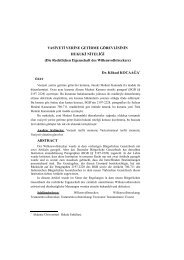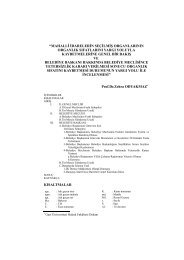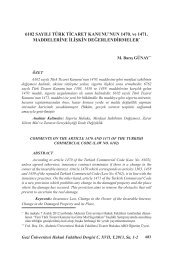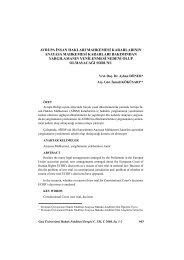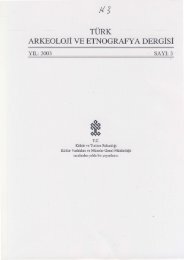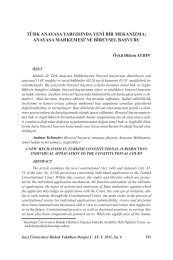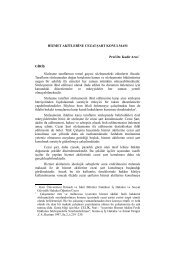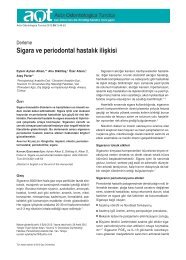ticari iÅletme devri ve devrin hukuki sonuçları - Gazi Ãniversitesi
ticari iÅletme devri ve devrin hukuki sonuçları - Gazi Ãniversitesi
ticari iÅletme devri ve devrin hukuki sonuçları - Gazi Ãniversitesi
Create successful ePaper yourself
Turn your PDF publications into a flip-book with our unique Google optimized e-Paper software.
Sema AYDIN / Hasan Ali KAPLAN / Arzu ŞEN KALYON<br />
has entered into force on July 1, 2012. In addition to this, in order to facilitate the<br />
transfer of the commercial enterprise procedure, New Commercial Code stipulates<br />
the acquisition without registration offi cially and transfers of the assets without<br />
performing the transaction required by the general provisions. The results and legal<br />
incon<strong>ve</strong>niency of the said regulation with respect to the “belie<strong>ve</strong> in registration”<br />
principle will be discussed in our article. Transfer of commercial enterprise has also<br />
regulated under the Turkish Obligation Code numbered 6098. Pursuant to the article<br />
202 of the said Code, in order to mention the transfer of the commercial enterprise,<br />
all assets and liabilities of the enterprises shall be transferred. Howe<strong>ve</strong>r, we discuss<br />
whether transfer of the assets and liabilities means the transfer of the all elements<br />
specific to enterprise. With regard to the labor law, consequences of the transfer of the<br />
commercial enterprises are also discussed due to its importance.<br />
Keywords: Enterprise, commercial enterprise, transfer of the commercial<br />
enterprise workplace, transfer of the commercial enterprise agreement.<br />
I. GİRİŞ<br />
1 Temmuz 2012 tarihinde yürürlüğe giren 6102 sayılı Türk Ticaret<br />
Kanunu 1 ’nun (YTTK) 11. maddesinde ilk kez <strong>ticari</strong> işletmenin tanımı<br />
yapılarak, <strong>ticari</strong> işletmenin hangi unsurlarının devre konu olacağı <strong>ve</strong> ayrıca<br />
devir sözleşmesinin kapsamı <strong>ve</strong> şekline ilişkin bazı şartları düzenlenmiş<br />
<strong>ve</strong> böylelikle mevzuatımıza bu konuda önemli bir yenilik getirilmiştir.<br />
Çalışmamızda; <strong>ticari</strong> işletme <strong>devri</strong>ne ilişkin olarak yapılan bu düzenlemenin,<br />
yine aynı tarihte yürürlüğe giren 6098 sayılı Türk Borçlar Kanunu 2 ’nun<br />
(TBK) 202. maddesi hükümlerini de dikkate alarak <strong>hukuki</strong> sonuçlarını bir<br />
mercek altına almayı amaçladık. Nitekim <strong>ticari</strong> işletme <strong>devri</strong>nde aktiflerin<br />
geçişi YTTK’da, pasiflerin geçişi ise TBK’da düzenlenmiş olduğu için her iki<br />
kanunda yapılan düzenlemelerin bir bütün olarak yorumlanması son derece<br />
önemlidir. Ticari işletme <strong>devri</strong>nin, iş hukuku açısından doğurduğu sonuçları<br />
da önemi nedeniyle çalışmamız kapsamında inceledik.<br />
II. TİCARİ İŞLETMENİN TANIMI<br />
Türk Ticaret Kanunu’nda merkez kavram, <strong>ticari</strong> işletme olmasına<br />
rağmen 6762 sayılı Türk Ticaret Kanunu’nda 3 (ETTK) bu kavramın tanımı<br />
1<br />
Resmi Gazete Tarihi – No: 14.02.2011 – 27846.<br />
2<br />
Resmi Gazete Tarihi – No : 04.02.2011 – 27836.<br />
3<br />
Resmi Gazete Tarihi – No: 29.06.1956 – 9353.<br />
230<br />
<strong>Gazi</strong> Üni<strong>ve</strong>rsitesi Hukuk Fakültesi Dergisi C. XVII, Y.2013, Sa. 1-2


